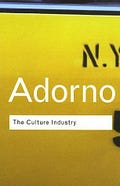“The Culture Industry is an unrivalled indictment of the banality of mass culture. A volume of Adorno's essays is equivalent to a whole shelf of books on literature.” -Susan SontagTheodor Adorno, one of the foremost thinkers from the Frankfurt School of Critical Theory, made a lasting impact with his critiques of mass culture and the homogenization of society. In The Culture Industry: Selected Essays on Mass Culture, Adorno dissects the rise of what he calls the “culture industry”—a system that commodifies cultural creations, particularly art, reducing them to items sold to the highest bidder. Adorno’s concern was that this industrialization of culture would strip art of its autonomy and deeper meaning, transforming it into mere entertainment engineered to reinforce the status quo. He extended this critique to other fields, such as scientific research, which he believed would similarly be shaped and limited by commercial interests. This line of thought has since found resonance, as we’ve seen trends in the commercialization of higher education and the “Disney-fication” of diverse cultures—transformations that make Adorno’s writings seem prophetic rather than alarmist.
Adorno’s unique perspective was partly shaped by his experience as a refugee from Nazi Germany, who relocated to Hollywood, California, in the 1940s. Living in the heart of the American entertainment industry, he witnessed firsthand the mechanics of mass culture and its influence on society. This exposure allowed him to foresee a future in which art and cultural products would become tools of social control, designed to pacify and entertain rather than provoke critical thought or challenge existing power structures. His warnings were not merely theoretical; they were deeply informed by his observations of a society increasingly oriented around consumption and spectacle, trends that would only grow stronger in the decades to follow.
Today, Adorno’s essays are worth revisiting not only as historical critiques but as foundational analyses that continue to inform discussions about media, culture, and the commodification of intellectual life. His work remains highly relevant in a world where the lines between art and advertising blur, and where public goods like universities and cultural heritage are increasingly privatized. In reading Adorno, one can trace the origins of many arguments now common in popular discourse, offering valuable insight into the effects of the culture industry on our lives and the systems of thought that shape modern society.



